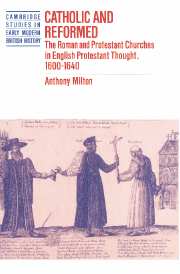Book contents
- Frontmatter
- Contents
- Acknowledgements
- List of abbreviations
- Prologue
- Introduction: English Protestantism at the dawn of the seventeenth century
- Part I The Church of Rome
- Part II The Reformed Churches
- 8 Doctrinal links: a harmony of confessions?
- 9 ‘The best Reformed Church’: church government and politics
- Conclusion
- Select bibliography
- Index
- Cambridge Studies in Early Modern British History
8 - Doctrinal links: a harmony of confessions?
Published online by Cambridge University Press: 31 October 2009
- Frontmatter
- Contents
- Acknowledgements
- List of abbreviations
- Prologue
- Introduction: English Protestantism at the dawn of the seventeenth century
- Part I The Church of Rome
- Part II The Reformed Churches
- 8 Doctrinal links: a harmony of confessions?
- 9 ‘The best Reformed Church’: church government and politics
- Conclusion
- Select bibliography
- Index
- Cambridge Studies in Early Modern British History
Summary
‘SISTERS OF THE REFORMATION’
Writing in 1645, Joseph Hall provided what may be taken as a definitive account of the way in which the Elizabethan and Jacobean Church of England had viewed her Reformed neighbours:
Blessed be God, there is no difference in any essential matter betwixt the Church of England and her Sisters of the Reformation. We accord in every point of Christian doctrine without the least variation; their public Confessions and ours are sufficient conviction to the world of our full and absolute agreement. The only difference is in the form of outward administration; wherein also we are so far agreed that we all profess this form not to be essential to the being of a church, though much importing the well or better being of it, according to our several apprehensions thereof; and that we do all retain a reverent and loving opinion of each other in our own several ways, not seeing any reason why so poor a diversity should work any alienation of affection in us, one towards another.
This form of argument may be found in almost every work of anti-papal polemic of the Elizabethan and Jacobean period whenever the writer addressed Roman charges of Protestant disunity. The authors emphasized that all Protestants were in complete agreement over the fundamentals of true doctrine – they merely agreed to differ on minor issues relating to ecclesiastical discipline. The Church of England's basic identification with the forces of Protestantism was unquestioned.
Although this argument became the standard reply to Roman charges of Protestant disunity, there was an extent to which it also served a polemical purpose in controversies among Protestants themselves.
- Type
- Chapter
- Information
- Catholic and ReformedThe Roman and Protestant Churches in English Protestant Thought, 1600–1640, pp. 377 - 447Publisher: Cambridge University PressPrint publication year: 1995



